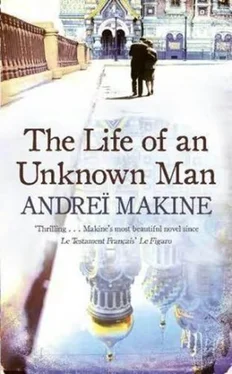Andreï Makine - The Life of an Unknown Man
Здесь есть возможность читать онлайн «Andreï Makine - The Life of an Unknown Man» весь текст электронной книги совершенно бесплатно (целиком полную версию без сокращений). В некоторых случаях можно слушать аудио, скачать через торрент в формате fb2 и присутствует краткое содержание. Жанр: Современная проза, на английском языке. Описание произведения, (предисловие) а так же отзывы посетителей доступны на портале библиотеки ЛибКат.
- Название:The Life of an Unknown Man
- Автор:
- Жанр:
- Год:неизвестен
- ISBN:нет данных
- Рейтинг книги:3 / 5. Голосов: 1
-
Избранное:Добавить в избранное
- Отзывы:
-
Ваша оценка:
- 60
- 1
- 2
- 3
- 4
- 5
The Life of an Unknown Man: краткое содержание, описание и аннотация
Предлагаем к чтению аннотацию, описание, краткое содержание или предисловие (зависит от того, что написал сам автор книги «The Life of an Unknown Man»). Если вы не нашли необходимую информацию о книге — напишите в комментариях, мы постараемся отыскать её.
The Life of an Unknown Man — читать онлайн бесплатно полную книгу (весь текст) целиком
Ниже представлен текст книги, разбитый по страницам. Система сохранения места последней прочитанной страницы, позволяет с удобством читать онлайн бесплатно книгу «The Life of an Unknown Man», без необходимости каждый раз заново искать на чём Вы остановились. Поставьте закладку, и сможете в любой момент перейти на страницу, на которой закончили чтение.
Интервал:
Закладка:
“By the way, I’ve learned what your surname means in Russian…,” she announced, taking advantage of the umpteenth coffee he was downing with a grimace.
Shutov pretended surprise but his face took on an evasive, almost guilty expression. He stammered, “Well, you know… There are several possible derivations…”
Léa emitted a peal of laughter, a tinkling cascade of breaking glass. “No. Your name has only one meaning…” She kept him waiting, then in a firm, disdainful voice, let fly: “ Shut means ‘clown.’ You know. A buffoon.”
She got up and made her way to the exit without hurrying, so confident was she of the effect of her words. Stunned, Shutov watched her walking away, followed by amused glances from the other customers, then jumped up, ran to the door, and there, amid the passersby, yelled out in a voice whose pained tones astonished even himself: “ Shut means a sad clown! Remember that! And this sad clown loved you…”
The end of the sentence faded away into a cough. “Like the whispering of the young lover in Chekhov’s story,” it occurred to him one evening, as he was staring at the last of Léa’s cardboard boxes, stacked there in the corner of the dovecote.
But that day, on his return from the café, for a long time he was incapable of thought, once more picturing a child in a row of other children, all dressed the same, a boy taking a step forward on hearing his name called and shouting, “Present,” then resuming his place. They are lined up in front of the gray orphanage building and after the roll call they climb into a truck and go off to work amid muddy fields under a fine hail of icy tears. For the first time in his life the child perceives that this name, Shutov, is his only possession here on this earth, the only thing that makes him “present” in other people’s eyes. A name he will always feel slightly ashamed of (that damned derivation!) but to which, however, he will be attached, for it is the name borne by that still-mute little being, who had seen the door closing on the person he loved most in all the world.
Across the street from the dovecote there is a narrow building with faded walls (“It’s been out in the sun too long, it’s peeling,” Léa used to say). The moon moves bit by bit across the little top-floor apartment. The workmen have not closed the windows and the room shines, like a sleepwalker’s dream. An old woman lived there once, then she disappeared, dead, no doubt, the dividing walls have been demolished to make an open-plan studio apartment, as fashion dictates, and now the moon keeps watch over this empty space and a drunkard with sad eyes marvels at it, as he whispers words intended for the woman who will never hear him.
After making love with her “guy,” she is asleep now in their new “place”… And everything hurts him, the way he imagines Léa’s friends talking and the idea of that young body, so close to him yet irretrievably lost. A body as supple as a frond of seaweed, which, in their intimacy, retained a touching, vulnerable awkwardness. To be dispossessed of those feminine arms, of those thighs, of Léa’s nighttime breathing: the mere thought of it is a blow to his solar plexus. A crude jealousy, a feeling of amputation. It will pass, Shutov knows this from experience. A body desired that now gives itself to another man can be forgotten quickly enough. More quickly, even, than one’s regret at never having spoken of the moon passing over the apartment across the street, of the woman who lived there, suffered, loved. And of the new life that will fill this white shell, bring in furniture, prepare meals, love, suffer, hope.
On occasion, after their literary quarrels, after making love, they would reflect on such unsettling aspects of human life. At these moments Shutov always felt that this was how he would have liked to be: passionate but detached, sensual, and at the same time conscious that, thanks to their measured conversations, Léa was rising with him to glorious heights…
A window lights up on the third floor of the building opposite. A young man, naked, opens a refrigerator, takes out a bottle of mineral water, drinks. A young woman, naked as well, goes up to him, embraces him, he moves away, his mouth clamped to the neck of the bottle, splutters, sprays his girlfriend, they laugh. The light goes out.
“That could be Léa with her boyfriend,” thinks Shutov, and, curiously enough, the scene eases the pangs of jealousy in the pit of his stomach. “They’re young. What do you expect…?”
He moves away from the window, collapses onto the sofa. Yes, his fatal error was to complicate everything. “She was rising with me to glorious heights…” What crap! A man unhappily close to the age of fifty suddenly has the luck to meet a pretty young woman who is no fool. And genuinely fond of him. He ought to take wing with joy, soaring aloft like a paraglider. Sing, bless heaven. And, above all, make the most of it. In the greediest sense of the phrase. Make the most of her clumsy, because genuine, tenderness, of their excursions (“We’re off to Paris,” they would say, traveling down from their patch in Ménilmontant), of the whispering of the rain on the roof at night. Of all those clichés of a love affair in Paris (oh, that singing of the rain!), intolerable in a book but so sweet in real life. Of this remake of a sixties romantic comedy…
For their love did last two and a half years, after all. Which is a good deal longer than an affair in one of today’s novels. He could very well have lived out one of those little stories that crowd the bookstore shelves: two characters meet, fall in love, laugh, weep, part, are reunited, and then she leaves or kills herself (according to taste) while he, with a tormented but handsome face, drives away into the night along an autoroute , heading for Paris, for oblivion. They were both of them in good health, as it happened, and with no suicidal tendencies. And, as for autoroutes , Shutov avoided them, not being a very confident driver. Yes, he could quite simply have been happy.
To achieve this, he should have risked being clear from the start: a young woman from the provinces leaves her parents, or rather her single-parent family, living in a region with a stricken economy to the north of the Ardennes, arrives in Paris where she runs into an “unusual” man who can give her a roof over her head. The young woman dreams of writing (“like all the French,” thinks Shutov) and although he is a writer with a limited readership, he will give her advice, possibly even help her to get published.
That, objectively, was their situation. All Shutov had to do was to accept it… But, like so many Russians, he believed that a happiness derived from petty practical arrangements was unworthy of people in love. At the age of fourteen he had read a story by Chekhov in which a couple’s material well-being counted for nothing beside the heady thrill of a moment on a snow-covered hill, on a toboggan run. At the age of eighteen, he had spent weeks strolling up and down in Leningrad’s parks beneath a golden canopy of foliage in the company of a girl: more than a quarter of a century later he would remember this as a vitally important time in his life. At twenty-two, as a young soldier sent to Afghanistan, he had seen an old woman lying dead in the courtyard of a house, clutching her dog in her arms, both of them killed by an exploding shell. Noticing his tears, his regimental comrades had called him a wimp (several years later this choking back of a sob would lead him on to political dissidence…). From his university studies he would retain the memory of a Latin text, words that had inspired Dante: “Amata nobis quantum amabitur nulla.” He meditated long on a woman “loved as none will ever be loved.” Such a love called for a sacred language. Not necessarily Latin, but one that would elevate the beloved above the mundane. Amata nobis… I love you, Nadenka…
Читать дальшеИнтервал:
Закладка:
Похожие книги на «The Life of an Unknown Man»
Представляем Вашему вниманию похожие книги на «The Life of an Unknown Man» списком для выбора. Мы отобрали схожую по названию и смыслу литературу в надежде предоставить читателям больше вариантов отыскать новые, интересные, ещё непрочитанные произведения.
Обсуждение, отзывы о книге «The Life of an Unknown Man» и просто собственные мнения читателей. Оставьте ваши комментарии, напишите, что Вы думаете о произведении, его смысле или главных героях. Укажите что конкретно понравилось, а что нет, и почему Вы так считаете.









